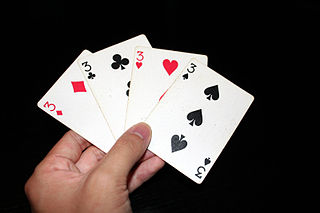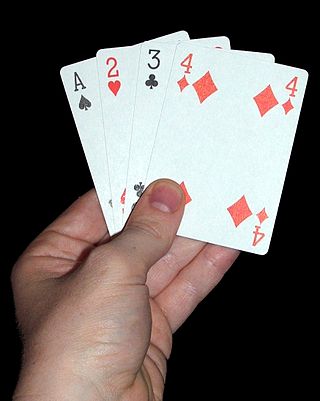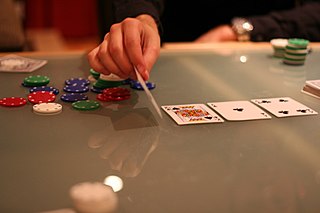Five-card draw is a poker variant that is considered the simplest variant of poker, and is the basis for video poker. As a result, it is often the first variant learned by new players. It is commonly played in home games but rarely played in casino and tournament play. The variant is also offered by some online venues, although it is not as popular as other variants such as seven-card stud and Texas hold 'em.

Poker is a family of comparing card games in which players wager over which hand is best according to that specific game's rules. It is played worldwide, however in some places the rules may vary. While the earliest known form of the game was played with just 20 cards, today it is usually played with a standard deck, although in countries where short packs are common, it may be played with 32, 40 or 48 cards. Thus poker games vary in deck configuration, the number of cards in play, the number dealt face up or face down, and the number shared by all players, but all have rules that involve one or more rounds of betting.

Gin rummy, or simply gin, is a two-player card game variant of rummy. It has enjoyed widespread popularity as both a social and a gambling game, especially during the mid twentieth century, and remains today one of the most widely-played two-player card games.
Five-card stud is the earliest form of the card game stud poker, originating during the American Civil War, but is less commonly played today than many other more popular poker games. It is still a popular game in parts of the world, especially in Finland where a specific variant of five-card stud called Sökö is played. The word sökö is also used for checking in Finland.
Seven-card stud, also known as Seven-Toed Pete or Down-The-River is a variant of stud poker. Before the 2000s surge of popularity of Texas hold 'em, seven-card stud was the most widely played poker variant in home games across the United States, and in casinos in the eastern part of the country. Although seven-card stud isn't as common in casinos today, it is still played online. The game is commonly played with two to eight players, though eight may require special rules for the last cards dealt if no players fold. With experienced players who fold often, playing with nine players is possible.
Razz is a form of stud poker that is normally played for ace-to-five low. It is one of the oldest forms of poker, and has been played since the start of the 20th century. It emerged around the time people started using the 52-card deck instead of 20 for poker.

Golf is a card game where players try to earn the lowest number of points over the course of nine deals.

Rummy is a group of matching-card games notable for similar gameplay based on matching cards of the same rank or sequence and same suit. The basic goal in any form of rummy is to build melds which can be either sets or runs and either be first to go out or to amass more points than the opposition.

Shanghai rum is a Rummy card game, based on gin rummy and a variation of Contract rummy played by 3 to 8 players. It is also known as California rummy.

Badugi is a draw poker variant similar to triple draw, with hand-values similar to lowball. The betting structure and overall play of the game is identical to a standard poker game using blinds, but, unlike traditional poker which involves a minimum of five cards, players' hands contain only four cards at any one time. During each of three drawing rounds, players can trade zero to four cards from their hands for new ones from the deck, in an attempt to form the best badugi hand and win the pot. Badugi is often a gambling game, with the object being to win money in the form of pots. The winner of the pot is the person with the best badugi hand at the conclusion of play. Badugi is played in cardrooms around the world, as well as online, in rooms such as PokerStars. Although it hasn’t had its own tournament per se at the WSOP, it is featured in the Dealers Choice events as well as in the Triple Draw Mix. The 2023 WSOP event does have a Badugi tournament scheduled.
Guts is a comparing card game, or family of card games, related to poker. Guts is a gambling game involving a series of deals of 2, 3, or 4 cards. Hand are ranked similarly to hands in poker. The betting during each deal is simple : all players decide whether they are "in" or "out", and announce this at the same time. Each deal has its own showdown, after which the losers match or increase the pot, which grows rapidly. A round of the game ends when only one person stays in and wins the pot.
In card games, hole carding is the obtaining of knowledge of cards that are supposed to be hidden from view. The term is usually applied to blackjack but can apply to other games with hidden hole cards, like three card poker and Caribbean stud poker. So long as it does not involve the use of a device like a mirror or actions like touching the dealer's cards, in most jurisdictions hole carding is a legal form of advantage gambling. In some games, like stud poker, casinos normally have rules against rubbernecking or having a confederate stand behind an opponent to signal hole cards.

Euchre is a 19th-century trick-taking card game and has many variations.
The following is a glossary of poker terms used in the card game of poker. It supplements the glossary of card game terms. Besides the terms listed here, there are thousands of common and uncommon poker slang terms. This is not intended to be a formal dictionary; precise usage details and multiple closely related senses are omitted here in favor of concise treatment of the basics.
Stud poker is any of a number of poker variants in which each player receives a mix of face-down and face-up cards dealt in multiple betting rounds. Stud games are also typically non-positional games, meaning that the player who bets first on each round may change from round to round. The cards dealt face down to each individual player are called hole cards, which gave rise to the common English expression ace in the hole for any hidden advantage.
Draw poker is any poker variant in which each player is dealt a complete hand before the first betting round, and then develops the hand for later rounds by replacing, or "drawing", cards.

Community card poker refers to any game of poker that uses community cards, which are cards dealt face up in the center of the table and shared by all players. In these games, each player is dealt an incomplete hand face down, which are then combined with the community cards to make a complete hand. The set of community cards is called the "board", and may be dealt in a simple line or arranged in a special pattern. Rules of each game determine how they may be combined with each player's private hand. The most popular community card game today is Texas hold 'em, originating sometime in the 1920s.
Dirty Schultz is a stud poker variant similar to Follow the Queen. The core difference between this and normal stud is that players dealt a visible pair acquire an additional wild card.
Wall Street Poker is a form of stud poker which also features community cards. It is named after the financial district of New York and the movie of the same name, because of a strategy of aggressive bidding involved.






